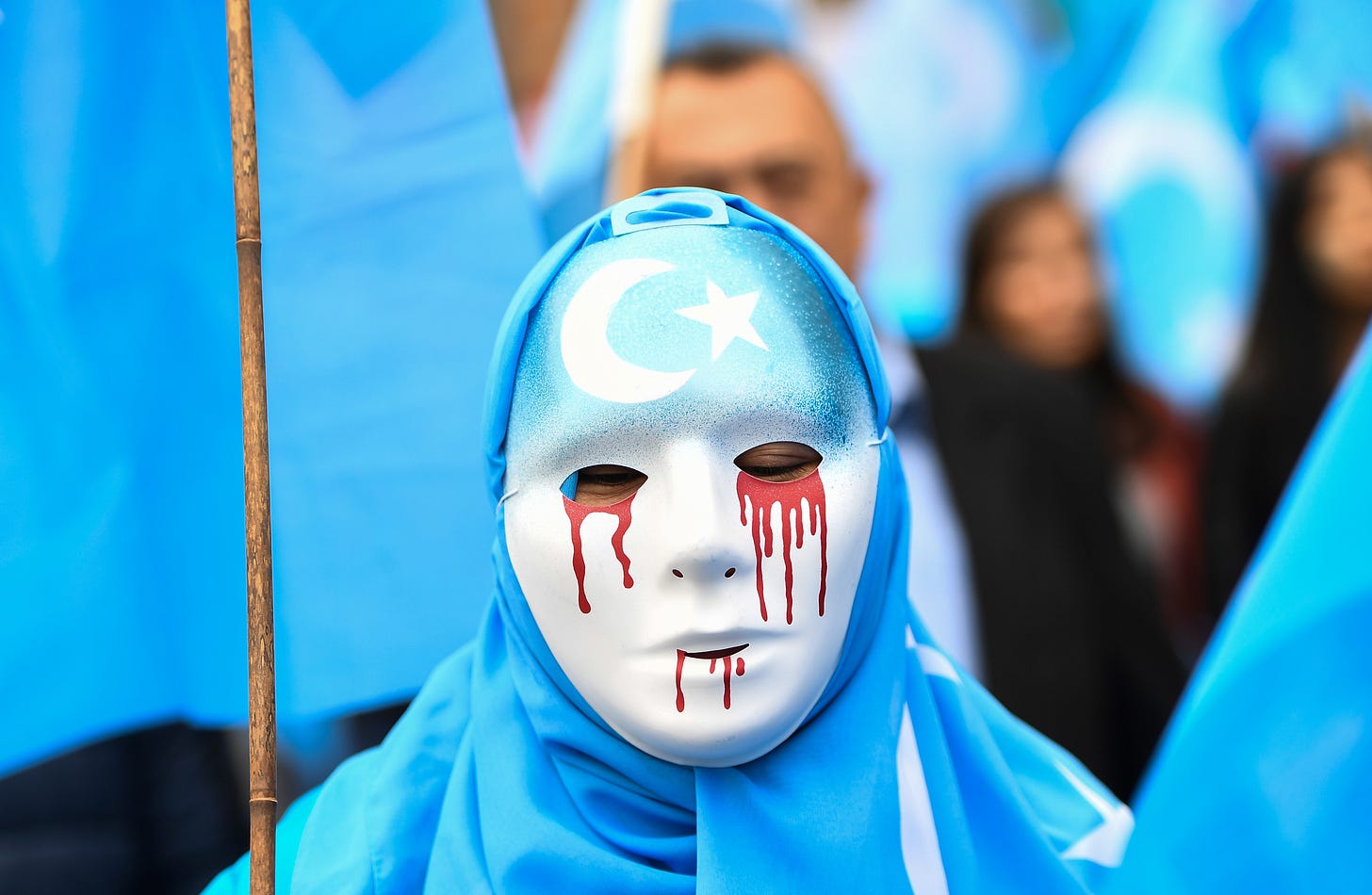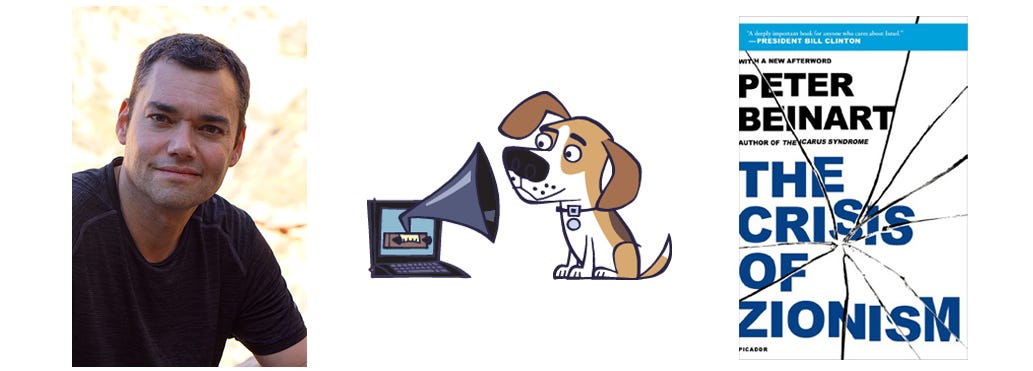The Darkness Visible In China
And the realism that requires we live with it

There’s a story in a recent Atlantic memoir by a Uyghur refugee that lingers in the mind. The Chinese authorities in Xinjiang Province now regard the possession of any religious literature, including the Koran, as prima facie evidence of terroristic activities. Terrified Uyghurs in Urumqi, the regional capital, have learned these past few years to quickly dispose of any such items — some throwing out books into the streets overnight so they could not be traced to their households. But one old man in his seventies forgot about a Koran he had possessed, and, coming upon it late, was too scared to hand it over, so threw it into a river. Alas,
the authorities had installed wire mesh under all bridges, and when the mesh was cleaned, the Quran was found and turned over to the police. When officers opened it, they found a copy of the old man’s ID card: In Xinjiang, the elderly have a habit of keeping important documents in frequently read books, so that they are easily found when needed. The police tracked down the old man and detained him on charges of engaging in illegal religious activities. He was sentenced to seven years in prison.
The “prisons” this elderly, devout Muslim was shipped off to now have a capacity of around one million people. They have been built at breakneck speed. Buzzfeed News has found “more than 260 structures built since 2017 and bearing the hallmarks of fortified detention compounds.” The more recent building suggests they are going to become permanent parts of a bid to wipe Uyghur culture from the face of the earth.
The Atlantic story helps you understand how eerily reminiscent this campaign is to the early Nazi-era treatment of Jews, all the way down to the initial disbelief that the genocidal campaign was beginning, to the slow creeping oppression, the sudden new checkpoints and security procedures, the separation of Han and Uyghurs, knocks on the door at night, the attempts of some to escape without detection, and the sudden disappearances of friends, relatives, co-workers — never to be heard of again.
We cannot know for sure what happens inside the camps, but reports from survivors include torture, starvation, force-feeding, solitary confinement, and brainwashing. And in some ways, the entire region is now an open-air prison: security cameras are everywhere, the imprisoned are pressured to incriminate others, police go house to house searching for illicit materials, mosques and neighborhoods are razed, Uyghur language is banned, phones monitored, face recognition technology is ubiquitous. Family members, waiting for their turn to be arrested, leave notes like this one from a husband to his wife:
If they arrest me, don’t lose yourself. Don’t make inquiries about me, don’t go looking for help, don’t spend money trying to get me out. This time isn’t like any time before. They are planning something dark. There is no notifying families or inquiring at police stations this time … I’m not afraid of prison. I am afraid of you and the girls struggling and hurting when I’m gone. So I want you to remember what I’m saying.
It’s important to note that the concentration camps for Muslims in China are not extermination camps. (At least not yet. “They are planning something dark” is not a sentence one ever wants to read.) But it is the greatest, systematic detention of a religious minority since the Second World War, championed by a newly emerged dictator-for-life, Chinese President Xi. And it is not going to stop any time soon.
The question at this point, therefore, is how we can or should react. The first priority, it seems to me, is not to look away. This is happening. It is evil.
The second priority is prudence. China, after all, is not a small and struggling country like Burma, where a similar genocidal campaign against the Muslim Rohingya has taken place. It isn’t in the heart of Europe, as Bosnia was, well within Western influence. It is the second greatest power on earth, an ancient and proud civilization, an economic behemoth, and a fast-rising military giant on the other side of the globe.
Unlike Germany in the 1930s, it has not been suffering under crushing Western reparations; in fact, its new economic power has been hugely enabled by the US-led trading systems. Equally, it is not the Soviet Union. China’s economic model of state-directed capitalism is far superior to Soviet backwardness, and it does not have an internationalist agenda of fomenting revolution across the globe. Fareed Zakaria notes that, in fact,
[China] has not gone to war since 1979. It has not used lethal military force abroad since 1988. Nor has it funded or supported proxies or armed insurgents anywhere in the world since the early 1980s. Beijing is now the second-largest funder of the United Nations and the UN peacekeeping program. It has deployed 2,500 peacekeepers, more than all the other permanent members of the Security Council combined. Between 2000 and 2018, it supported 182 of 190 Security Council resolutions imposing sanctions on nations deemed to have violated international rules or norms.
But it is obviously a rising global power, with all the ambition that comes with it. That means a military build-up, the inevitable obliteration of freedom in Hong Kong, saber-rattling against Taiwan, continued belligerence in the South China Sea, clashes with India on the border, trade tussles with Australia and continued repression in Tibet. And it seems to me that we should not regard much of this as outrageous. It’s what emerging powers do. Rising Britain once laid claim to over half the globe. As the US arrived on the scene, it too bossed around its own region — in the Caribbean, Central and South America.
And no, Taiwan is not a vital US interest, and we shouldn’t pretend it is. Nor is there any conceivable way the American public would support a global war to defend an island on the other side of the world — a war which essentially every Pentagon war-game predicts we’d lose. We should, it seems to me, maintain a certain ambiguity about Taiwan, and stress to the Chinese the huge international blowback if it were to be the aggressor in such a conflict.
Economic de-coupling — to some extent — makes sense. Bringing manufacturing back to the US where we can, tightening defenses of our technological edge, deepening economic ties across the Atlantic, and strengthening our alliance with the Quad countries (India, Japan, Australia) are all no-brainers. China is not helping itself with its neighbors and we should capitalize on this. But we do not, it seems to me, need to make the mistake we made with post-Soviet Russia — pushing our NATO commitments far further than we should have, and treating a proud nation with disrespect.
Unlike with the Soviets, we also have a global emergency we need China’s cooperation and help with: climate change. There is no longer any hiding of the fact that we are facing a global catastrophe, made much, much worse by China’s coal plants and breakneck growth. Without their signing off on drastic carbon reduction, we are all fucked. Similarly with one result of that climate change: a world which will likely endure ever more viral outbreaks of unknowable power, released as the ground thaws, species move, and temperatures gyrate. You can see the Covid disaster — and China’s key role in creating it — as a reason to cut them off, and isolate them. I understand that. But, given their technological capacities, how does this actually help us stymie the next plague?
“Hide your strength; bide your time,” was Deng Xiaoping’s famous advice. He meant it for China, of course, but it’s not entirely irrelevant to America in tackling this first-order foreign policy challenge. The US military budget is four times’ China’s and our economy much more resilient. If this is a global competition between two systems, we’d do better to upgrade our own rather than seek a way to destroy a rival.
And what China truly is helps defuse some of the hysteria that demonizes America: China, not America, is a built on a racist (Han) supremacy. As Jonah Goldberg notes, China is far, far worse on “free speech, democracy, police abuse, racism, reproductive freedom, corporate greed, colonialism, and corruption.” What China does to the Tibetans and Uyghurs makes Israel’s treatment of the Palestinians (while lamentable) seem minor. Where is the BDS for China, one wonders?
We cannot save the Uyghurs from the Chinese, just as we couldn’t save the Czechs from the Soviets. But we can keep their plight as transparent as we can, bring it up every time we engage Beijing, and boycott goods made by forced labor. We cannot save Taiwan. But we can drastically raise the cost for China if it launches an attack. We cannot decouple our economies completely; but we can draw some lines, to ensure our economic resilience, independence, and marginal tech superiority. We cannot create democracy in China; but we can shore it up at home.
We cannot prevent major US companies from becoming enmeshed with a totalitarian country; but we can shame them when they re-write their film scripts, or when they manufacture their products with slave labor, or when they distract from their enabling of real oppression with woke takes on “oppression” in America, or when they kowtow to China’s language police. It should be possible for there to be a revulsion at China’s model on both right and left in America. And Biden’s framing of our rivalry as one between a free society and a totalitarian one is a contrast that can also win converts abroad if we do not overplay our hand.
There is, however, a deep moral cost to this. I cannot say my conscience is clear in recommending this pragmatism. All I can offer in defense is that this is the Niebuhrian price of living in a fallen world. And I’ve learned the lessons of over-moralizing when it comes to intervention across the globe. We should neither ignore nor forget the Uyghurs, even if we cannot save them. But we also need to live with the cruel realities of global politics, rather than wish them away. From that core and sobering realism, sane policy comes. And all the tragedy that follows.
(Note to readers: This is an excerpt of The Weekly Dish. If you’re already a subscriber, click here to read the full version. This week’s issue also includes: my response to the high-tech outing of Monsignor Burrill via Grindr; a reader dissent over Catholics and abortion; a foreign policy discussion on the Weekly Dish — at last — with Peter Beinart, namely on Israel, China, and South Africa; the latest genius from Lil Nas X; three notable quotes on race relations; an audio reading of my first impression of candidate Obama in May 2007; a haunting window view from Beijing and another one from a backyard in San Francisco; a Seinfeldian mashup for our Mental Health Break, eight Dish-recommended pieces from other substackers; and, of course, the results of the View From Your Window contest — with a new challenge. Subscribe for the full Dish experience!)
From a new subscriber:
I think it’s about time to show my thanks and appreciation by subscribing to The Weekly Dish. I first heard you speak in Adams Morgan years ago, not long after I came out as a gay Catholic, just starting out in DC. I next heard you years later as a Jesuit scholastic at Boston College. I’ve read your work throughout that period. More recently, I read a piece you wrote that was in email circulation among former Jesuits, and was finally moved to support you.
In subscribing here, I run the risk of falling into the same trap I accuse of friends at either end of the political and cultural spectrum, namely of supporting only those who tell them what they want to hear. I don’t really care. In struggling to maintain objectivity and my own integrity, it’s nice to know you’re out there, a kindred spirit. May God bless you and inspire you to continue to raise these questions for both of us — indeed, for all of us.
New On The Dishcast: Peter Beinart
Peter is a long-time friend and fellow former editor of The New Republic. His latest book is The Crisis of Zionism, and he’s the editor-at-large for Jewish Currents and the creator of his own substack, The Beinart Notebook. In this episode we focus on foreign affairs — China, Israel, and South Africa — as well as our shared apostasy when it comes to Iraq and neoconservatism. In the last half-hour of the pod, we get into a heated debate over the merits of racial diversity and viewpoint diversity in magazines and op-ed pages.
For three clips of my conversation with Peter — on how the U.S. should deal with China; on whether Zionism has failed; and how Peter has dealt with the Jewish-American tribalism — head over to our YouTube page. Listen to the whole episode here.
That link also brings you to a half-dozen reader emails debating critical race theory, including one from a former teacher and current administrator in the NYC public school system who tells me to chill the fuck out. We also hear from a reader who broke the cycle of addiction with the help of both psychedelics and the pellucid writing of Michael Pollan, our latest pod guest. As Dina would say, catch it!
The High-Tech Outing Of A Gay Priest

The civil war within the American Catholic church has entered a new, more aggressive phase. Go here to read my full response to the outing of Monsignor Jeffrey Burrill, the most senior Catholic priest in the church.
Dissents Of The Week
We didn’t get many dissents over last week’s issue, since it was primarily a pitch for my new essay collection, but here’s a reader who reaches back to a June column:
In “Our Very Catholic President,” you state, “On abortion, the taking of life from the most vulnerable human beings in the world, the unborn...” You state this as fact. Maybe you are just stating this from the Catholic Church’s perspective. Either way, it sounds as though it’s your belief as well. I would very much like to know your response to Garry Wills’ essay in the NYT, “The Bishops Are Wrong About Biden — and Abortion.” The historian of Christianity explains that abortion is never condemned in the Bible, nor in Dante’s circles of hell, and Aquinas taught that a young fetus has no soul. “In other words,” Wills writes, “the fetus in its long pre-rational life is not a human being.”
Read my response here, along with another reader dissent.
Out On A Limb: My First Impression Of Barack Obama
Here’s another audiobook excerpt from the upcoming collection — my first encounter with Obama on the campaign trail in the spring of 2007:
You can pre-order “Out on a Limb,” my collection of essays, columns, op-eds, and blog posts since 1989, at this link (or use this special page to get a signed copy). I just finished recording the audio version (pre-order on Audible or Google Play), so each piece will be available in my own voice.
Here’s the excerpt we released last week, on the death of my beloved beagle, Dusty:
A reader writes:
I lost my beloved 19-year-old cat two months ago, and I lost his brother at 15-and-a-half in 2017. I read your blog post when you wrote it back in 2013 and was moved by it, but revisiting it now through the lens of my own grief, it is gut-wrenching.
For each of my cats, I wrote a lengthy tribute that I emailed to friends and family, and a lot of people replied that they’d never seen anyone write something like that for a pet. I remembering thinking, “I guess none of these people read the Daily Dish.” Anyway, even years later, you have my condolences, Andrew. My cats were, like you say, the only children I’ll ever have (and they are the only pets I’ve ever had). They were my constant companions, with me in every moment spent at home, which is most of my moments, and even more so in the past year. The world will never be the same without them.
ICYMI
I was recently on Debra Soh’s podcast talking about the AIDS crisis.
I’m one of the talking heads for the new Netflix docuseries, “How to Become a Tyrant,” narrated by Tyrion Lannister.
The View From Your Window Contest
Where do you think it’s located? Email your guess to contest@andrewsullivan.com. Please put the location — city and/or state first, then country — in the subject line. Proximity counts if no one gets the exact spot. Bonus points for fun facts and stories. The winner gets the choice of a VFYW book or two annual Dish subscriptions. If you are not a subscriber, please indicate that status in your entry and we will give you a three-month sub if we select your entry for the contest results (example here if you’re new to the contest). Happy sleuthing!
The results for the last week’s window are coming in a separate email to subscribers later today.
See you next Friday.




